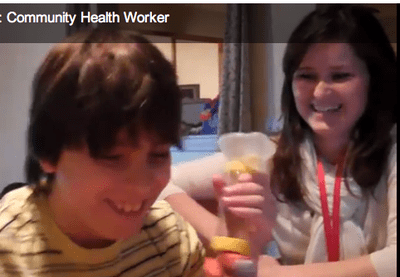Advertisement
In Case You Missed It: Foot Soldiers Of Health Make Housecalls

I wrote a piece Friday about an ambitious new program that deploys community health workers to the homes of poor, chronically sick people in order to improve these patients overall health — mental, physical and otherwise. (And since many of our loyal followers appear to check out on Fridays, I'm revisiting it here, in case you missed it.)
These health workers, part nagging mom, part medical fixer, part guide through daunting insurance and social service bureacracies, do what ever it takes to connect patients to better health: they help with transportation and child care, advise on mental health problems and promote asthma and diabetes management. They can feel like a close aunt, or sister, talking to a new mom about post-partum depression, for instance, and when necessary, a health worker might even pick up a sponge, to help a patient learn how to clean the house.
The goal of the program, Network Health Alliance, is clear: better care for the patient and lower cost to the system by reducing expensive emergency room visits and hospitalizations and enveloping people more fully into a primary care setting.
In an odd twist, the concept of community health workers originated in poor countries like Haiti, as part of a more integrated health system promoted by the renowned doctor, Paul Farmer:
Here in Massachusetts, this wealthy medical mecca of high-tech hospitals, community health workers are part of an experiment to use low-tech lessons learned in the poorest of countries, Haiti. As the state, and the nation, begin to revamp broken parts of the health care system, the need for these health workers, who fill a critical gap by supporting families in their homes, is clearer than ever before, says Partners In Health co-founder Paul Farmer, the doctor famed for developing a cadre of such workers in Haiti. “There has been more discussion about the need for innovation in this arena this year than ever before,” he said. We are finally acknowledging that “it is very expensive to give bad medical care to poor people in a rich country.”
If you want to learn more, read Atul Gawande's excellent story on "Hot Spotters" in The New Yorker, and Tina Rosenbeg's piece in The New York Times about a program that uses health workers to support AIDS patients in New York City.
And listen to Radio Boston, which is planning to air a segment on community health workers Tuesday at 3.
This program aired on March 28, 2011. The audio for this program is not available.
